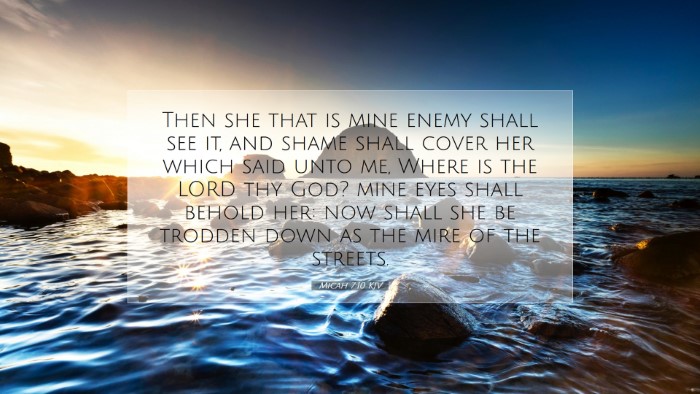Old Testament
Genesis Exodus Leviticus Numbers Deuteronomy Joshua Judges Ruth 1 Samuel 2 Samuel 1 Kings 2 Kings 1 Chronicles 2 Chronicles Ezra Nehemiah Esther Job Psalms Proverbs Ecclesiastes Song of Solomon Isaiah Jeremiah Lamentations Ezekiel Daniel Hosea Joel Amos Obadiah Jonah Micah Nahum Habakkuk Zephaniah Haggai Zechariah MalachiMicah 7:10
Micah 7:10 KJV
Then she that is mine enemy shall see it, and shame shall cover her which said unto me, Where is the LORD thy God? mine eyes shall behold her: now shall she be trodden down as the mire of the streets.
Micah 7:10 Bible Commentary
Commentary on Micah 7:10
Bible Verse: "Then she who is my enemy will see it, and shame will cover her who said to me, 'Where is the LORD your God?' My eyes will look upon her; now she will be trampled down like the mire of the streets."
Contextual Overview
Micah, a prophet from Moresheth, prophesied during a time of moral decay and impending judgment in Israel. His messages blend the themes of divine judgment and hope. Chapter 7 serves as a poignant conclusion wherein Micah reflects on the state of Israel, articulating both lament and hope for eventual restoration.
Verse Analysis
Micah 7:10 speaks of God's vindication in the face of adversaries who denounce His people and their faith. Here, the prophet addresses the shame felt by the enemies of Israel, specifically highlighting the mocking question, "Where is the LORD your God?" This phrase captures the essence of skepticism faced by believers, akin to the challenges faced throughout the ages.
Insights from Commentaries
1. Matthew Henry's Perspective
Henry emphasizes that the prophetic voice here points to a day of reckoning when God's people will be vindicated. He elucidates how the enemy, far from finding satisfaction in their taunts, will instead experience humiliation. The phrase "ashamed" underscores the eventual reversal of fortunes, suggesting a divine retribution that restores the honor of the faithful.
2. Albert Barnes' Commentary
Barnes highlights the transition from the trials undergone by Jerusalem to the prophetic assurance of triumph. He notes that the "enemy" symbolizes not just a personal adversary, but broader forces that stand against God's covenant people. The rendering of "trampled down" evokes a vivid image of defeat, reinforcing the certainty of God's intervention on behalf of His people.
3. Adam Clarke's Analysis
Clarke places great significance on the rhetorical question posed by the enemy. He examines the irony embedded in the mockery—the very question that aims to undermine the faith of the Israelites will become a point of shame for the adversaries. Clarke expounds on the notion that God's faithful will indeed witness the downfall of those who mocked their reliance on Him, interpreting this passage as a promise of justice and divine fidelity.
Theological Reflections
This verse encapsulates a profound theological truth: that God ultimately defends His name and His people. It serves as a reminder for pastors, theologians, and students that even in the midst of despair, there exists hope in God's covenant promises. The expected humiliation of the enemy signifies a restoration of faith for Israel, who can stand assured of God’s faithfulness amidst their trials.
The Nature of Enemies
The enemies referenced in Micah 7:10 likely encompass any force opposing God's people, including cultural, political, and spiritual adversaries. This multifaceted understanding allows modern readers to contextualize their challenges, recognizing that opposition may come from various fronts but that God remains sovereign over all.
Encouragement for the Faithful
- A Call to Patience: Believers are encouraged to remain steadfast in their faith, trusting that God will execute justice in His time.
- The Promise of Vindication: The assurance of eventual triumph should empower the faithful to endure their suffering, reminding them that God sees their trials.
- The Power of Hope: The promise of restoration speaks to the importance of hope in the life of the believer, helping to sustain faith in seemingly hopeless situations.
Conclusion
Micah 7:10 is rich with the themes of shame, vindication, and divine justice. Its powerful message serves as a clarion call for believers to maintain their faith, secure in the knowledge that their God reigns supreme. By drawing together insights from classic commentaries, we understand this verse as both a warning to the adversaries of God’s people and a source of hope for those who trust in His name. In times of mockery and challenge, God’s faithfulness will shine forth, ultimately reconciling His people to Himself.


